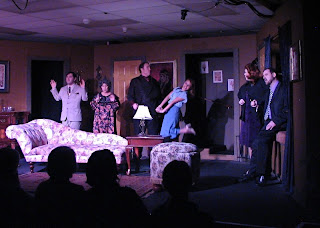A woman recently asked me to teach her how to direct a choir. In thinking about how I might sum it up, I somewhat randomly came up with four steps. 1) Know the basics, 2) know what you want, 3) inspire and 4) convey the passion. Simple, succinct, whatever. Good for a Facebook post. But as I thought about it, I realized that I really stand by those steps. I think they apply whether leading a choir, choreographing a dance or directing in the theater. In each of those situations, the person in charge must be a teacher of sorts. To teach in any area of the arts requires similar skills.
One – Know the basics. For a choir, that can be the beat patterns, reading the music, the terminology. It is similar when directing theater. You need familiarity with the script, a basic sense of organization in terms of schedules and budgets and available resources. Without these, you cannot hope to move forward with any success. Start with a good foundation.
Two – Know what you want. This is where it starts getting fun – and challenging. In a choir, I must decide how I want the music interpreted. Do I want them to follow all the markings for dynamics and tempo? Do I want something different? How do I hear it in my head? In theater, I have other decisions to make. Do I want to copy some other performance, or give unrestricted freedom to the actors to work it out themselves, or (my usual happy medium goal) find a blend of what has worked elsewhere, and what is fresh and interesting? Participants will ask questions I may not necessarily anticipate. I need a strong sense of the direction I want in order to keep everyone moving along the same path. Understand your own vision, then share it.
Three – Inspire. Simply going through the motions never results in a very worthwhile performance. As a director, a leader, a teacher, I want those I’m working with to see their potential. I would hope they will feel the joy of being a part of something special. It doesn’t have to be of great social, emotional or spiritual significance to still be something worth reaching for. When I start Xanadu rehearsals, there won’t be any pretense about the greater good, the deeper significance. It’s all just lighthearted fun, but I am hoping there will still be the same kind of focused energy that goes into creating a great performance (all inspired by Greek muses, of course!). I feel it’s my job to keep everyone motivated and encouraged.
Four – Convey the passion. Taking inspiration one step further, I often try to share my own feelings about the project. I’ll talk to the actors about the characters and their relationships. I’ll discuss the lyrics, the phrases, the jokes or the emotions that are meaningful to me in the hope that they might ultimately be meaningful to the audience as well. If I feel passionate about something I’m teaching, I hope that the participants will come to feel passionate about it, too. It isn’t enough that they understand how I feel. They need to feel it themselves. When they do, as I have seen time and time again, the performance comes alive. It is emotionally enriching for everyone and the audience is touched by the power of both what is seen and what is heard.
I have a first rehearsal coming up for a choir I’m directing that is performing next month. They’re only preparing two songs, but it’s a new choir put together just for the occasion. I hope I can help them through the basics, clearly share my expectations, inspire them to do well – really well, and help them to feel passionate about this wonderful music.
So, I will direct them, and I’ll probably dance a bit. I have come to accept that I am an animated choir director (you can take the girl out of the theater, but you can’t take the theater out of the girl) and will do whatever I think is helpful to draw the emotion out of the singers. It’s not quite Sister Act, but I’m expecting great things!



